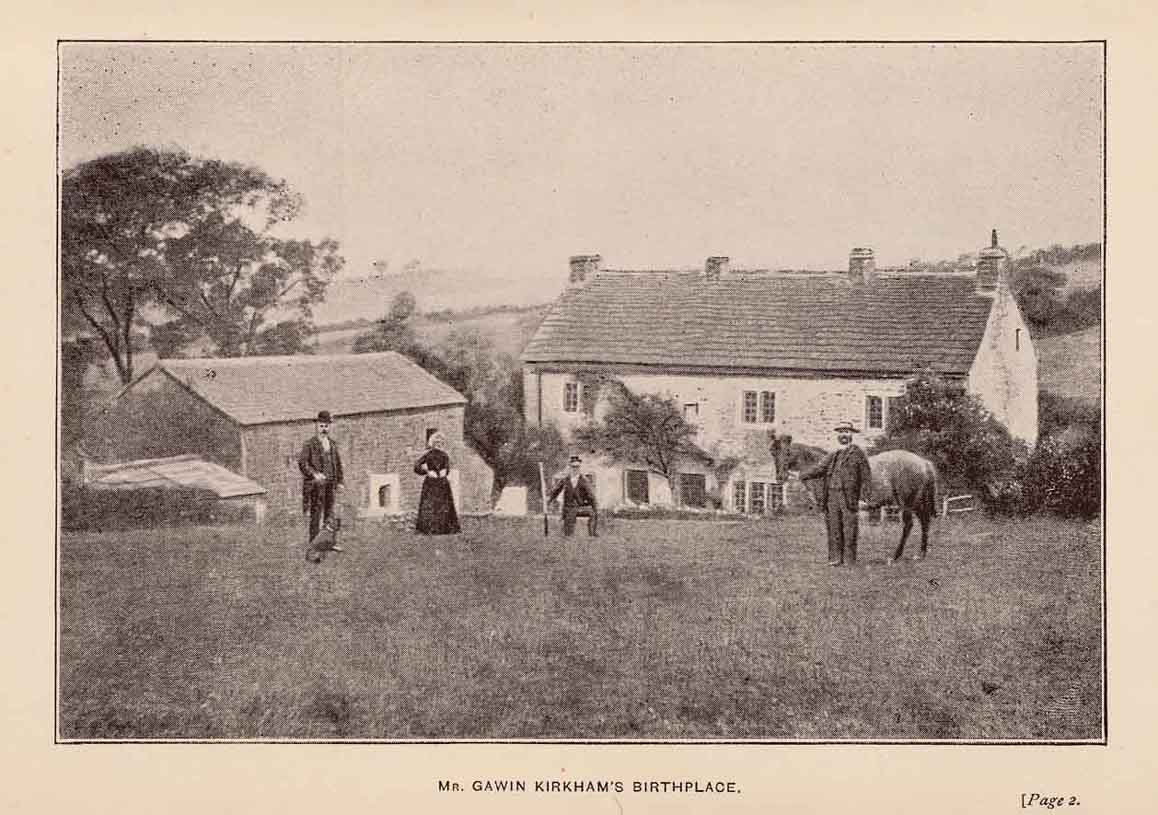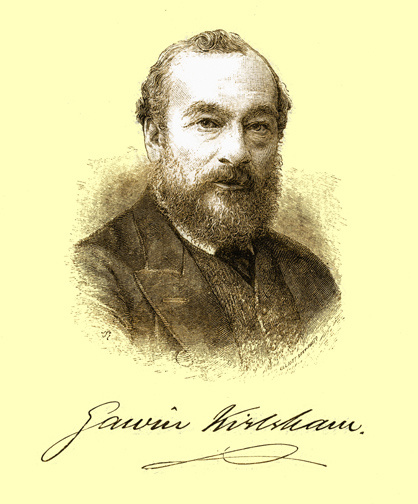|
CHAPTER I.
The Dawn of the Day; and Early Toils.
Leaving the busy town of Lancaster, and, seeking scenes more rural, we ascend the valley of the silvery Lune. Hornby is reached anon ; and here we strike into the, open country on the road to Kirkby Lonsdale. But soon we forsake this broader highway ; for we have found a lane at the entrance of which an aged guide-post informs us that the hamlet of Eskrigge is not far off. And this, to confess the truth, is the object of our search. The rural byway rises until, standing at its highest point, We turn to enjoy a charming landscape, where the Lune displays its coquettish loveliness, and the more distant mountains appear with varying distinctness. Then, resuming our walk, and beginning to descend the "high ridge” which the name Eskrigge implies, we approach some scattered farmhouses of the cottage type. It was in one of these buildings—far removed from the world’s loud calls, and in the midst of nature’s quiet whispers—that, on the 9th of August, 1832, Edward and Ann Kirkham welcomed the advent of Gawin, their second boy.

Into this household was born family which eventually numbered ten. Two alone survive at the time of writing—William, the eldest child; and Edward, the third. Converted to God in youth, William became a candidate for the foreign mission field ; was accepted and trained for service by the Church Missionary Society; and in 1856 embarked for Abeokuta, on the West Coast of Africa. But health failed after two years’ labour, and a return to England was inevitable. He has ever since acted with singular devotion and perseverance as a parish Scripture Reader. Edward emigrated to the United States; took part as a soldier in the Civil War, and was wounded ; and having finally settled in Brooklyn, has been long and usefully engaged in the mission work connected with the church over which the Rev. Dr. Talmage presides. All the remaining seven children were daughters. Two only grew to womanhood ; and of the others the family tombstone in Gressingham church-yard records that Ellen died at the age of ten months ; Ann survived two years; Mary six ; a second Ann ten ; and Mary Alice sixteen.
Edward Kirkham, the father of this family, was a native of Weeton, in the parish of Kirkham, about midway between Preston and Blackpool. For a yeoman he possessed a somewhat superior education ; and for many years he held the post of churchwarden and overseer of Gressingham parish, in which the hamlet of Eskrigge is situated. He was a man of much shrewdness, and was remarkable for the fund of native humour he possessed. Ann Kirkham, his wife (whose maiden name was Herdman) also belonged to the Fylde district, as that part of Lancashire is called, and was related to farmers of substancial means. A mother of no common order we know her to have been, and one to whose influence we trace much of that steadfast moral principle which was so characteristic of Gawin Kirkham ; while her tenderness and love for her children won their hearts, and predisposed them to follow the example of her unfailing industry. Long years after, when her second boy had become a strenuous supporter of Lord's Day sanctity, he gratefully recalled the fact that his to his mother he owed his earliest impulses in that sacred cause.
Death's sombre visitations to the home, it will have been observed, were sadly frequent. Soon the family
grave received its first child-occupant, and on four later occasions were its mournful portals opened before Gawin Kirkham’s years attained maturity. We cannot doubt that these events deepened his early thoughtfulness, and turned his mind with unwonted constancy towards the region of the unseen
and the eternal.
The Dame School
Those were the days of dame schools; and old Jane Danson’s, at Gressingham, was a highly typical one. Her place of punishment for erring scholars was a dark closet under the stairs; and usually a threat of confinement within its gloomy walls compelled obedience from her most stubborn and rebellious scholars. Various old prints of a decidedly curious sort adorned her cottage walls ; one of which depicted Adam and Eve standing on either side of the Tree of Life, while the serpent wound itself around the trunk. Here then, as a child, Gawin Kirkham, together with his brothers, received such rudimentary instruction as dame Danson was able to impart. As they grew somewhat older, they were transferred to more distant and more efficient schools at Aughton (pronounced Afton) and at Melling. Even so, their educational privileges ceased with the recurrence of certain seasons. For in the spring of 1838 or 1839 the family removed to a farm named Borrons, consisting of some one hundred and sixty acres, and situated at the opposite extremity of the parish of Gressingham.
Farm Work at Borrons
Here Gawin’s life presently began in earnest ; for, as soon as he was old enough, his father required his constant assistance in the work of this larger farm. Spring, summer, and autumn, were fully occupied ; and only the return of winter made a resumption of regular study possible.
But here I must needs relate an incident—one, indeed, of a series—which proved a lasting blessing to the boy whose youthful fortunes we are following. A new vicar of Gressingham had been appointed, by name, the Rev. William Stratton. The charge, and its attendant income, were alike inconsiderable ; and so, to augment the latter, this gentleman engaged himself to teach the day school at Aughton. Walking thither day by day, accompanied by his two sons, it came to pass almost of necessity that his young scholars from Borrons Farm became his further companions. The clergyman’s enlightened mind willingly opened to the
enquiries of the boys; and thus these daily conversations, hardly less than the teaching received within the school itself, created in their dawning intellects such a love for learning, and such a desire to obtain it, as never afterwards forsook them. Hence-forth the vista of their little world began to widen, and books were eagerly read. Standing alone among the fields, apart from any other dwelling, the seclusion of Borrons Farmhouse is almost complete. Here, as I have said, Gawin’s uneventful but laborious lot was for the present cast, and no thought of any other had as yet occurred to him. The toil was unremitting. Aching limbs, benumbed hands, and clothing drenched by the showers of spring, were its natural and expected accompaniments. Ploughing, weeding, planting, harvesting, threshing, winnowing—all this and much more helped to make up the yearly round of agricultural operations which fell to him. He bore the yoke in his
youth : life itself was early a discipline and an education. Thus faithfully did he labour with his hands, who, in years as yet undreamt of, was destined in the providence of God to sow more precious seed in wider fields and on more varied soils ; to reap more glorious harvests ; and to draw a wealth of spiritual illustration from nature’s processes. It would be wrong to imagine, however, that such a boyhood lacked in its own distinctive though unobtrusive interest. Ingleborough's lofty peak was always visible, and a mountain’s varying aspects of sunshine and shadow may ever be watched with quiet pleasure. Wild duck, snipe, and teal haunted a dam constructed in a hollow near to Borrons; while in summer pewits wheeled round it, uttering their plaintive cries, and dragon-flies darted hither and thither among its surrounding rushes. Mrs. Kirkham rightly forbade her children to rob birds’ eggs, but they were permitted to search for and look at the nests; and it is characteristic of the methodical exactness which afterwards distinguished him that for some time Gawin kept a written record of such expeditions and their resultant discoveries.
Bathing in the sea at Black Dyke, near Carnforth, was an occasional recreation, and once proved a perilous one to father and sons. Owing to some delay, the tide was nearly at its height before they reached the spot ; and the marks of the father’s footprints afterwards showed, when the tide had ebbed, that Mr. Kirkham had carried his boys close to the edge of a deep hole formed by the removal of sand. Not one of the party could swim, and all felt that they had bee n mercifully preserved from certain death by drowning.A drive to Newton, several miles away, made another red-letter day whenever it occurred. Mrs. Kirkham’s brother, a large farmer, resided there ; and the boys greatly enjoyed a visit to their cousins. To be shown their rabbits and other pets, to take tea in the best parlour, to hear their relatives sing, and to be afterwards driven home beneath the overhanging trees, and with the moon’s still light glittering through the branches, made them feel among the happiest and most favoured mortals in the world. Books were rare indeed ; and The Pilgrim's Progress, Draper's Bible Story Book, Evenings at Home, and Robinson Crusoe, almost completes the list of Gawin’s literary treasures as a boy. But these were eagerly perused on winter evenings ; and it is almost pathetic to hear that in imagination every incident of Bunyan’s allegory was supposed to have happened in some locality with which he was familiar! Gradually, however, there came a sensible widening of this narrow literary horizon.
Sabbath School Lessons
The village Sabbath School was reformed, the vicar’s wife herself assuming charge. Lessons from collect, epistle, and gospels, were memorized by the scholars, to whom small books were presented as rewards. Watts’ Divine Songs for Children, too, formed part of the course of instruction. Many of these sank deeply into Gawin’s retentive memory, to be used, in the days of his wayside ministry, as appropriate feathers for Gospel arrows. “In the learning of these Sabbath School lessons,” says Mr. William Kirkham, “we were greatly assisted by our mother. On a Saturday night, when we were disposed unduly to prolong our games, she would fetch us in, make us clean our shoes ready for Sunday morning, and learn our lessons perfectly before going to bed. As a young woman I believe our mother had received impressions for good under the Rev. Carus Wilson, of Tunstal (afterwards of Casterton) ; and she knew too well the value of religious instruction to allow her children to grow up without it while they were under her control.” Indeed, the mother’s vigilant care for her children, and its necessity, received at this time a startling illustration. One evening, Gawin accompanied his father on a visit to the village inn, and there in some mysterious way fell into a situation fraught with peril. For a travelling pedlar lodging in the inn persuaded Gawin to go to bed with him, promising that on the morrow they should depart together, and that henceforth the boy should share the pedlar’s fortunes. The news reached the mother’s ears. Without an instant’s delay she hastened to the inn, and never rested until her boy, delivered from such dangerous hands, had been safely housed once more under the family roof. Thus, in God’s great goodness, temptation was averted ; and the young life, destined to be so precious to the church of Christ, was saved from the snare of the destroyer.
Another temptation annually befell him at this period : Gawin had become a member of the village choir, and had learned to play the clarionet in church; and it was the custom of the choir each Christmastide to sing carols through the village, visiting every house. But this was by no means an unmixed good ; for by many of the inhabitants the members of the choir were rewarded with intoxicating drink. And not only so ; but the evening’s programme was invariably concluded by a visit to the village inn, where, often till past midnight, the songsters lingered. No words are needed to emphasize the evil of all this, or the danger to which young Gawin was thus exposed. But Divine protection was round about him ; and, all unconsciously, God was his shield and his defence.
A Humble Sphere
We must pass at once to notice an event the issues of which were destined largely to affect his future. This was the erection, behind the vicarage, of a school-house for young gentlemen, whom Mr. Stratton proceeded to receive into his house as student boarders. This enlarged establishment necessitated an increase in the number of his domestic servants, and amongst them the engagement of a youth for the performance of miscellaneous duties. Behold the vicar, therefore, on a certain Monday morning in the year 1845, pursuing his way across the fields in the direction of Borrons Farm. Be it related, with reluctance, however, that on the previous day our hero, now thirteen years of age, had absented himself from the village Sabbath School, and had surreptitiously indulged in a feast of sweetmeats. The sight of the good vicar’s approaching form failed therefore to arouse within him such feelings of lively pleasure as were usual under similar circumstances. Ashamed of his action, he fled, and hid in an adjoining outhouse. Venturing forth after what he judged a sufficient interval, and expecting to receive the parental reproof which conscience had already begun to administer, what was his surprise and delight to hear that he, Gawin Kirkham, had been engaged by the vicar in the capacity above mentioned, at an annual salary of no less than seventy shillings, together with a suit of clothes! It was a humble diligence and sphere indeed ; but it was filled rectitude. And the events that were to follow proved its appropriateness. Here many lessons for the great life-work that was beyond his vision were to be acquired ; here, amidst a multitude of common tasks, he was to learn the essential greatness of little things ; and here, most and best of all, he was to be born of God. And may we not, just here, utter a tender word to some young reader, who —like Gawin Kirkham, poor and unthought of by the great world, and hidden in some quiet eddy of its mighty current—is tempted to think the days are wasted because they are so ordinary and so unvaried? Nay ; for none of the tasks God sets us can be menial; duty that He appoints never can be profitless ; and days bright with his presence lose their accustomed dullness. Out of the eddy, if you will but give your heart to Him, and learn his lessons, He will lead you into larger opportunities, where amid life’s broader currents it may be your joy to rescue shipwrecked and despairing souls. It was with the advent of these years that there appeared in Gawin Kirkham’s life some buddings of the coming spring—premonitory symptoms of future fruitfulness. And, first of all, his diligence. The tasks that daily fell to him were accomplished with unusual speed and care ; a book lying open before him the while, whenever possible, that his studies might be pursued. And then, his thrift. Many readers may recall the amusing way in which, during his lecture on “ The Broad and the Narrow Way,” he described his boyish pride when his father deposited in a Savings Bank the sum of ten shillings on his behalf; mentioning the careful saving of his early salary, presently increased to five pounds, from year to year; and telling of the use to which all this was put when, on a subsequent day, he “ asked somebody if she were willing to become somebody else, and she, like a sensible soul, said 'Yes.' ”
The Influence of Gressingham Vicarage
One exception there was, indeed, to the rule that regulated the disposal of his yearly wage. There came a Sabbath, doubtless after his conversion, when the pulpit of Gressingham Church was occupied by a foreign missionary deputation, who pleaded for help on behalf of his society. Then it was that the vicar’s servant-lad, in the intensity of his interest, willingly contributed a sum it had taken him a year to earn! And, ere this chapter is concluded, another matter of import must needs be emphasized, namely, the gracious influence of the vicar’s character and counsel upon the mind and heart of the youth in his employ. It would be difficult to exaggerate the blessing that resulted, even in a preparatory sense. To the end of life Gawin Kirkham cherished lively gratitude for the memory of his master; and we shall not err in devoutly tracing the course of the career we now commemorate to those early springs which arose, at first almost invisibly and unconsciously, amid the round of humble duties performed, with such serious exactitude and such growing interest in life’s great volume of realities, by the boy at Gressingham Vicarage. Thus gladly have we traced the first gray streaks of light that told of coming dawn. For, “ as for God, his way is perfect,” though indeed “ past finding out.” He works in silence ; and, or ever the light of day appears, earth is made mysteriously ready to welcome the glowing radiance of heaven.
____________________________
Next Chapter 2
Ch1. Ch2. Ch3. Ch4. Ch5. Ch6. Ch7. Ch8. Ch9.
~~~~~~~~~~~~~~~~~~~~~~~~~~~~~~~~~~~~~~~~
|











